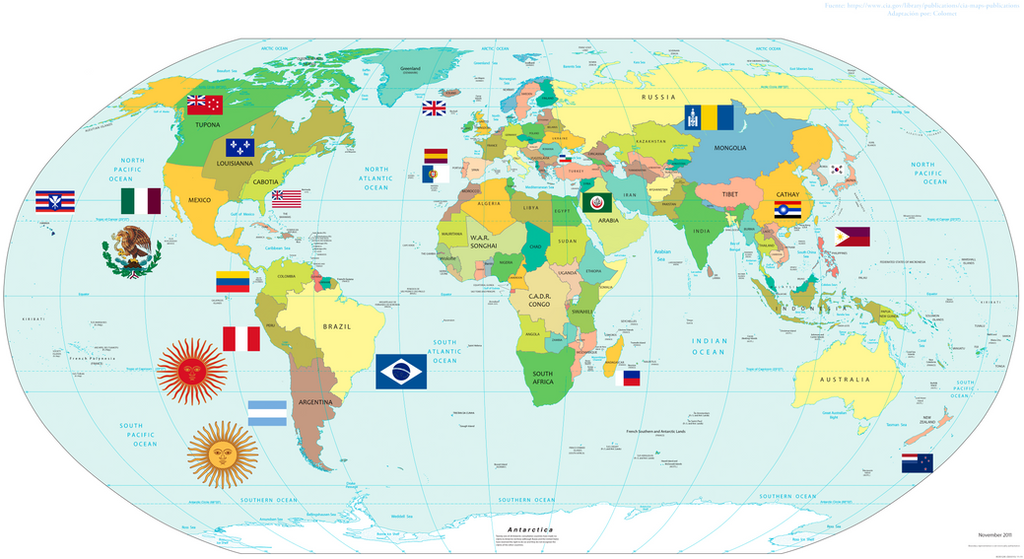HOME | DD
 shellymaps — Personal World
shellymaps — Personal World

#alternate #history
Published: 2018-01-25 02:43:38 +0000 UTC; Views: 1142; Favourites: 10; Downloads: 24
Redirect to original
Description
Original Map: commons.wikimedia.org/wiki/Fil…An alternate history of our world, many things stay the same, other things, very different.
Tupona: Originally just an acronym for The United Provinces of North America, but no one bothers to write out or say every single letter anymore. Only on official documents and speeches people will recite the original "name" of the country. Other North American countries are aware, but do not acknowledge it, as they do not like its implications. Tupona became independent in the late 1900's, but is still part of the British commonwealth.
Cabotia: Named after John Cabot, an explorer who discovered the coasts of North America for England. There were many cries for independence in the late 1700's, but they have all failed and Cabotia stayed part of Brittain until it finally was allowed independence in the late 1900's along with its sister nation of Tupona. Tuponans and Cabotians slightly similar culturally, Tupona is very European culturally with slight native American admixture and rare African mixture, their accent seems to be a mix of Northumbrian, Scottish and Irish. While the Cabotian dialect is a bit more flat, sounding more similar to a mix of south western English dialects. Though the more recent pressure from Britain from programs such as the BBC caused the two nations to slowly adapt some words to be more similar to the London accent. The accents of the two countries eventually stopped changing, by once again, the late 1900's when each country gained independence and more local accents were aired on radio and TV, these local accents merged again and again and became somewhat of a standard throughout the country, causing the Tuponan and Cabotian accents to solidify.
Louisiana: France never acquired Haiti and thus never lost its desire to colonize North America. After winning the seven years' war, both countries were low on money. But the English, seeing how they lost, did not want to lose their colonies in vain, so they tried everything they could to keep them in check. The French opted sell swaths of land to the Frenchmen and it was prohibited for any Englishman to directly own land in Louisiana. While France enjoyed a cash boom, this would not last, the revolution did eventually take place, the Royal family relocated and ruled from Louisiana, since France was, by this time, broke again, they did not put in the effort to invade Louisiana. Many loyalists, tired soldiers, and not to mention, criminals, saw Louisiana as a way to get out of the drama that was happening in France. After France got itself sorted out again, they went to check on the colony and were given a rude awakening to find the "King of France in exile", instead of going to war about it, they chose to create a charade that they're still in control, and claim that he is simply the vice-royalty, as to keep England at bay. Some of the Englishman obviously didn't believe this, but if they were to declare war on Louisiana, everyone knew France would automatically join in anyway. And so the act was kept up until the king declined in power and eventually abdicated and gave full authority to the Parliament, as by this point, he felt nothing more than a mere accessory to the country. France conveniently claimed that Louisiana simply declared independence. In modern times, the French Charade is merely a conspiracy theory, now everyone believes Louisiana's claims of what actually happened.
Mexico and The Filipines, like Tupona and Cabotia, did not become independent until the 1900's, the two countries sat through Francisco Franco's regime and gladly took in refugees and the minorities expelled from Spain such as the Catalonians and the Basque. The Filipines speak in a Castellano-Spanish-Chavacano accent, while the Mexicans still speak in a distinctly Mexican accent, albeit with more Castellano influence, words such as Vos, Vosotros and the /θ /sound instead of /s/ for some words with c and z is not the standard in Mexican Spanish like it is in Spain, it is used of course, by Mexicans of more recent European descent and tends to be more regional.
The word "Vale" is essentially the Spanish "Okay", the word "okay" is heavily discouraged to use as it is an English American invention.
Mexico in this universe uses Bolígrafo (ball point pen) a bit more frequently compared to the common word Pluma(feather/pen), but keep in mind, Bolígrafo is considered a bit more formal and more specific (Ball Point Pen). And so the proper terms are
Feather Pen: Pluma y tinta (feather and ink)
Fountain Pen: Pluma estilográfica / Pluma Fuente
Pen in general: Pluma
Ball Point pen: Bolígrafo
There also exists
Pencil: Lápiz
Mechanical Pencil: Lápicero
Marker: Marcador
Marker-Pen: Rotulador, but also sold as, Plumón and referred to as more literally Marcador-Pluma.
Highlighter: Resaltador, commonly referred to as Marcatextos.





















